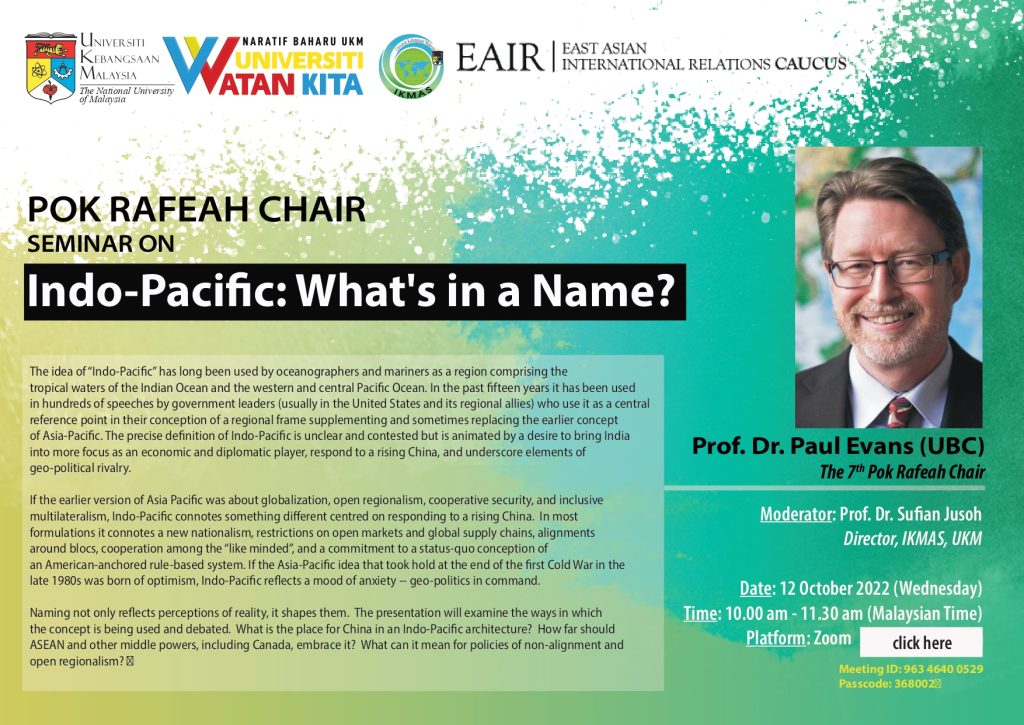
About the seminar
The idea of “Indo-Pacific” has long been used by oceanographers and mariners as a region comprising the tropical waters of the Indian Ocean and the western and central Pacific Ocean. In the past fifteen years it has been used in hundreds of speeches by government leaders (usually in the United States and its regional allies) who use it as a central reference point in their conception of a regional frame supplementing and sometimes replacing the earlier concept of Asia-Pacific. The precise definition of Indo-Pacific is unclear and contested but is animated by a desire to bring India into more focus as an economic and diplomatic player, responds to a rising China, and underscore elements of geo-political rivalry.
If the earlier version of Asia Pacific was about globalization, open regionalism, cooperative security, and inclusive multilateralism, Indo-Pacific connotes something different centred on responding to a rising China. In most formulations it connotes a new nationalism, restrictions on open markets and global supply chains, alignments around blocs, cooperation among the “like minded”, and a commitment to a status-quo conception of an American-anchored rule-based system. If the Asia Pacific idea that took hold at the end of the first Cold War in the late 1980s was born of optimism, Indo-Pacific reflects a mood of anxiety — geo-politics in command.
Naming not only reflects perception of reality, it shapes them. The presentation will examine the ways in which the concept is being used and debated. What is the place for China in an Indo-Pacific architecture? How far should ASEAN and other middle powers, including Canada, embrace it? What can it mean for policies of non-alignment and open regionalism?
About the speaker
Paul Evans has been a Professor at the University of British Columbia since 1999, teaching Asian and trans-Pacific international relations. His work was based at the Institute of Asian Research and the Liu Institute for Global Issues which are both located in the School of Public Policy and Global Affairs (SPPGA). On January 1, 2021, Dr. Evans was appointed the HSBC Chair in Asian Research. In 2022, he was appointed as the 7th Pok Rafeah Chair at IKMAS and he will lead a research project on “Middle Power Collaboration in Shaping an Indo-Pacific Order.” He will convene a workshop, give a public lecture, as well as lead research-sharing sessions with IKMAS fellows and graduate students.
An advocate of cooperative and human security, he has been studying and promoting policy-related activity on track-two security processes and the construction of multilateral institutions since 1988. He was a co-founder of the Council for Security Cooperation in Asia Pacific (CSCAP), the Canadian Consortium on Human Security, and the Canada-Korea Forum. He has directed exchange and partnership projects with fifteen research institutes in Asia and the Chinese Ministry of Foreign Affairs funded by governments and foundations in Canada, Japan, the United States, China, Taiwan, South Korea, Thailand and Indonesia. Between 1990 and 2002 he organized two dozen meetings involving participants from North Korea.
He is currently a Canadian representative on the ASEAN Regional Forum’s Experts and Eminent Persons Group.
A member of the Global Council of the Asia Society in New York, he also sits on the editorial boards of The Pacific Review, the Chinese Journal of International Politics, the China Quarterly for International Strategic Studies, and Mexico y la Cuenca del Pacifico.
